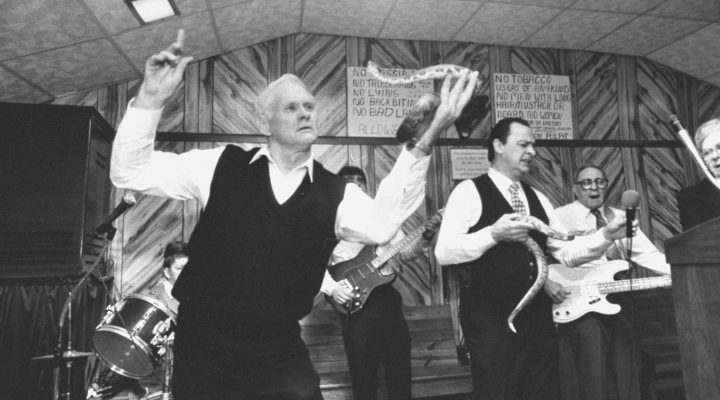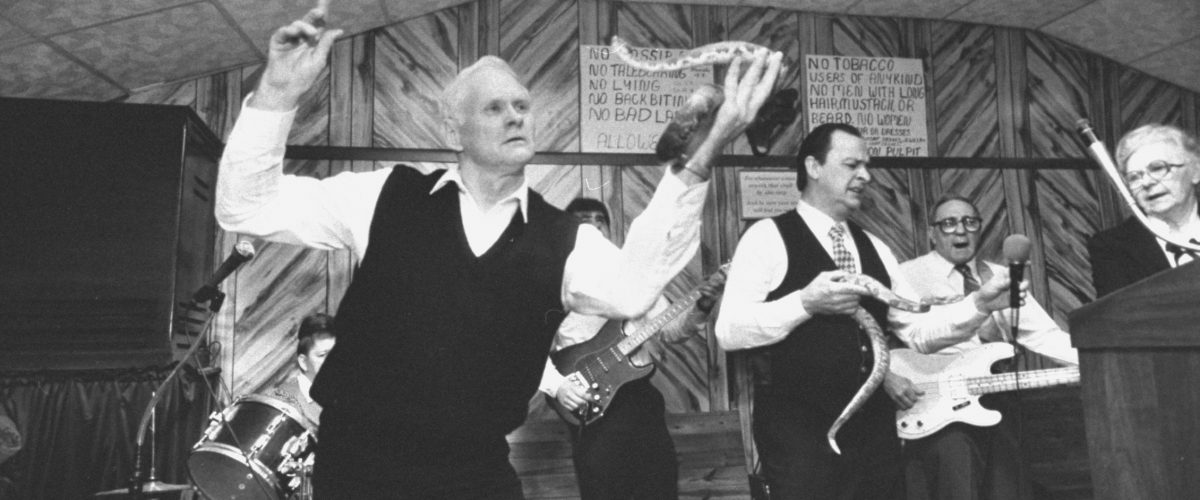For me, Palm Sunday didn’t work this year.
In the liturgical calendar, Palm Sunday introduces Holy Week, a momentarily joyous prelude to the agony of Golgotha. Palm Sunday is supposed to give us hope that will strengthen us to walk with Jesus through Gethsemane, Golgotha, Good Friday and the borrowed tomb. Yes, resurrection lies ahead, but, as one of my longtime friends said: “You can’t get to the empty tomb until you go through Gethsemane.”
Psalm Sunday should prepare us for that terrible journey.

Bill Leonard
Jesus of Nazareth enters Jerusalem on “a colt that has never been ridden,” as “the whole multitude of the disciples began to praise God joyfully with a loud voice, shouting out, ‘Blessed is the king who comes in the name of the Lord! Peace in heaven, and glory in the highest heaven!’”
The great Presbyterian preacher George Buttrick writes of that Palm Sunday moment: “Part of the glory of it lay precisely in its lack of restraint. More or less would not serve: it was top to bottom now, altogether: and who was going to worry about what might happen (next)?”
That first century celebrative event was apparently so unrestrained that some folks thought the public outbursts of the Jesus crowd had gotten out of hand, insisting he shut it down.
Jesus sees it differently. “If these (people) were silent,” he declares, “then the stones would shout out.”
Sometimes, when God’s Palm Sunday grace comes near, we throw caution to the wind. Joy overtakes us, tempering restraint, at least for the moment.
Not this year, at least not for me. On March 29, Golgotha came too early, preempting or at least sobering the way we read and try to understand Jesus’ “triumphal entry” into Jerusalem. Why? Because on that day, a 28-year-old shooter fired a semiautomatic weapon through the glass doors at Covenant Presbyterian School in Nashville, entered the building, and shot down six people, three adults and three 9-year-olds. Police “neutralized” the killer before further massacres occurred. The daughter of the church’s pastor is among the victims.
On Palm Sunday 2023, the shouts of Hosanna turned to wails of unrestrained sorrow, at least in Nashville. There, and perhaps across the American nation, on this Palm Sunday the stones probably should have “shouted out” because the rest of us have, or should have, hearts too broken for praise.
We’ve already joined Jesus in Gethsemane. “Lord, if possible, let this burgeoning cup of child murders pass from us!”
On the third day after the Nashville shooting, the third day, Golgotha came even closer, at least in North Carolina where I live. On that day, the state General Assembly voted to override the governor’s veto of “a bill ending local background checks for pistol permits,” the Winston-Salem Journal reported. The vote was 71-49 with all 71 Republicans voting for and 49 Democrats opposing. The Senate voted 30-19 “along party lines.”
Those 71 individuals are “representative” of many Americans, determined to keep throwing open the firearm floodgates, making it easier to access “legally secured” assistance in conducting mass shootings. You might have thought the North Carolina “peoples’ reps” would at least have delayed the vote for say, “pastoral reasons” given its proximity to yet another child sacrifice event.
“They rushed North Carolinians to Golgotha as quickly as possible.”
No, they rushed North Carolinians to Golgotha as quickly as possible. Not even one of the 71 “positive” voters considered the hurt, no, the insult their vote brought to the grieving families of the Nashville dead.
The House speaker even declared the bill “allows all churches and other place of religious worship to protect their parishioners and launches a statewide firearm safe storage awareness initiative.”
Did he think that would sanctify their insensitivity?
Last week I delivered the George Shriver Lectures on Appalachian Christianity at Stetson University, a Baptist-founded school in DeLand, Fla. The lectures, however, were given online, from a conference room at Wake Forest University. In the last of the three presentations, I reflected on the Appalachian serpent handlers, a tiny religious communion I’ve written about across the years.
Interpreting Mark 16:17-21, they believe they “confirm the word” of God for the rest of us, “taking up serpents” as a sign of the presence and power of God in our midst. Elizie Preast, a West Virginia serpent handler, says:
But it does say, “They shall take up serpents.” And Jesus is the one’s doing the talking. Said, “They shall take them up.” Well, I’ve got to do it, or somebody’s got to do it, or else it makes Jesus out a liar, because if I tell you shall go out that door, it means that you’ve got to go out there, one way or the other. . .. If we don’t do it, Jesus can raise up a people that will do it.
I’ve known a number of serpent handlers, even inviting two of their preachers to speak at two of the three schools where I’ve taught. These Pentecostal-Holiness folks are sincere, dedicated, Christ-loving individuals, but they are wrong in their biblical exegesis, and upward of a hundred of them have paid with their lives for their mistaken theology.
“In 2023, it is time to add guns to Merton’s list of idols.”
The ever-insightful Trappist monk and author Thomas Merton observed that serpent handling isn’t limited to an Appalachian sect. Merton observed that sometimes our more sophisticated snakes and idols, our gods of technology, science, culture, religion represent our attempts to give meaning to our immediate failures and struggles, to prove our worth and validate our way of life. In 2023, it is time to add guns to Merton’s list of idols.
It begins, Merton says, in moments of crisis, when we feel ourselves and our traditions called into question. It is “our reaction to the deep stirrings of guilt in ourselves and our society. When the image of what we want to be or have been is fading, we turn to snake handling. … We seize a serpent, pursue some dramatic event, win a symbolic victory which proves we are still strong, right and powerful.”
“Snake handling is a daring and ritual act,” Merton writes, “a magic gesture that is visible and recognized by others, which proves to us that we are right, that we have worth and our rightness cannot be contested and whoever contests it is a messenger of the devil.”
In Holy Week 2023, we are a nation of serpent handlers, illustrated in the votes of 71 members of the North Carolina General Assembly, a national idolatry grounded in a faulty exegesis of the Constitution’s Second Amendment. That mistaken constitutional hermeneutic continues to cost the lives of Americans, making firearms the leading cause of child deaths, a statistic far beyond that of any other developed country in the world.
The Covenant School shooting and the 71 members of the North Carolina General Assembly pushed us, at least pushed me, beyond a road carpeted with palms, to the Via Dolorosa, the way of sorrows, on which Jesus “came, bearing his Cross.”
Easter too, will come, true enough, and we will cling to the hope of resurrection, confessing at the empty tomb, “He is not here, he is risen!” But the families and friends of the 131 persons cut down in mass shootings in the first three months of 2023 know, in their unquenchable grief, that those tombs are not empty.
We’d best remember that, come sunrise Easter morning; and, for Christ’s sake, and the sake of children in every American classroom, try to let go of our semiautomatic serpents.
Bill Leonard is founding dean and the James and Marilyn Dunn professor of Baptist studies and church history emeritus at Wake Forest University School of Divinity in Winston-Salem, N.C. He is the author or editor of 25 books. A native Texan, he lives in Winston-Salem with his wife, Candyce, and their daughter, Stephanie.
Related articles:
In the gun violence debate, let’s stop scapegoating mental illness | Opinion by Curtis Ramsey-Lucas
Mass shootings, DNA swabs and gospel triage: America 2022 | Opinion by Bill Leonard
Our national golden calf is killing us | Analysis by Chris Conley


